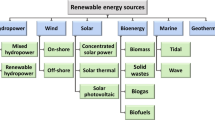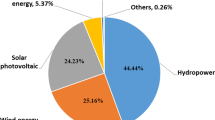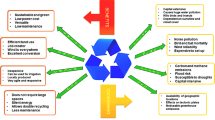Abstract
An assessment of the overall impact of the observed and expected climatic changes on energy production, distribution, and consumption in Russia is presented. Climate model results of various complexity and evaluation data on the vulnerability of various energy production sectors to climate change are presented. It is shown that, due to the increase of air temperature, the efficiency of electricity production at thermal and nuclear power plants declines. According to the climate model results, the production of electricity at TPPs and NPPs by 2050 could be reduced by 6 billion kW h due to the temperature increase. At the same time, as a result of simulation, the expected increase in the rainfall amount and river runoff in Russia by 2050 could lead to an increase in the output of HPP by 4–6% as compared with the current level, i.e., by 8 billion kW h. For energy transmission and distribution, the climate warming will mean an increase in transmission losses, which, according to estimates, may amount to approximately 1 billion kW h by 2050. The increase of air temperature in summer will require higher energy consumption for air conditioning, which will increase by approximately 6 billion kW h by 2050. However, in total, the optimal energy consumption in Russia, corresponding to the postindustrial level, will decrease by 2050 by approximately 150 billion kW h as a result of climate- induced changes. The maximum global warming impact is focused on the heat demand sector. As a result of a decrease in the heating degree-days by 2050, the need for space heating is expected to fall by 10–15%, which will cause a fuel conservation sufficient for generating approximately 140 billion kW h of electricity. Hence, a conclusion about the positive direct impact of climate change on the Russia’s energy sector follows, which is constituted in the additional available energy resource of approximately 300 billion kW h per year.
Similar content being viewed by others
References
C. B. Field, V. R. Barros, D. J. Dokken, K. J. Mach, M. D. Mastrandrea, T. E. Bilir, M. Chatterjee, K. L. Ebi, Y. O. Estrada, R. C. Genova, B. Girma, E. S. Kissel, A.N. Levy, S. MacCracken, P. R. Mastrandrea, L. L. White., Climate Change 2014: Impacts, Adaptation and Vulnerability. Part A: Global and Sectoral Aspects (Cambridge Univ. Press, Cambridge, UK, 2014).
The Second Evaluation Report on Climate Change and Its Consequences on the Territory of the Russian Federation, Ed. by V. M. Kattsov and S. M. Semenov (Rosgidromet, Moscow, 2014).
G. V. Soiko, “Technoeconomic optimisation of threeloop combined-cycle arrangements for Russian conditions,” Candidate’s Dissertation in Engineering (Moscow Power Engineering Inst., Moscow, 2013).
S. Yu. Burtsev and E. K. Arakelyan, “Analysis of the influence of outside temperature on the dynamic characteristics of CCP-450,” Energy Saving and Water Treatment, No. 6, 11–22 (2015).
A. A. Korshikova, “Optimisation of CCP-450 operational parameters to increase operational flexibility,” Candidate’s Dissertation in Engineering (Moscow Power Engineering Inst., Moscow, 2015).
V. I. Artemov, K. B. Minko, G. G. Yan’kov, and A. V. Kiryukhin, “Simulation of heat and mass transfer processes in the experimental section of the air-condensing unit of Scientific Production Company “Turbocon”,” Therm. Eng. 63, 319–328 (2016). doi 10.1134/S0040601516050013
V. V. Klimenko, A. V. Klimenko, A. G. Tereshin, D. S. Beznosova, and T. N. Andreichenko, “Changing pattern and amount of the residential and commercial energy consumption in response to economic and climatic factors,” Therm. Eng. 59, 807–815 (2012).
V. V. Klimenko, A. G. Tereshin, T. N. Andreichenko, A. V. Bokarev, E. V. Markovcheva, and L. P. Rogatovskaya, “Estimation of energy use for air conditioning in Moscow in the conditions of expected climate change,” Energy Saving and Water Treatment, No. 1, 2–6 (2011).
E. M. Akent’eva, G. I. Sidorenko, and G. A. Tyusov, “To the evaluation of the influence of observed and expected climate changes on the hydropower potential of the regions of Russian Federation,” Voeikov MGO Proc., No. 257, 95–105 (2014).
V. V. Klimenko, A. V. Klimenko, E. V. Kasilova, E. S. Rekunenko, and A. G. Tereshin, “Performance of gas turbines in Russia under the changing climatic conditions,” Therm. Eng. 63, 690–698 (2016). doi 10.1134/S0040601516100049
V. V. Elistratov, Renewable Power Generation (S.-Peterb. Politekh. Inst., St. Petersburg, 2016).
H. Koch, S. Vögele, F. F. Hattermann, and S. Huang, “The impact of climate change and variability on the generation of electrical power,” Meteorol. Z. 24, 173–188 (2015).
B. Hoffmann, S. Häfele, and U. Karl, “Analysis of performance losses of thermal power plants in Germany — a system dynamics model approach using data from regional climate modeling,” Energy. 49, 193–203 (2013).
D. R. Klein, M. Olonscheck, C. Walther, and J. P. Kropp, “Susceptibility of the European electricity sector to climate change,” Energy. 59, 183–193 (2013).
M. D. Bartos and M. V. Chester, “Impacts of climate change on electric power supply in the Western United States,” Nat. Clim. Change 5, 748–752 (2015).
D. Burillo, M. Chester, and B. Ruddell, “Electric grid vulnerabilities to rising air temperatures in Arizona,” Procedia Eng. 145, 1346–1353 (2016).
X. Zheng, C. Wang, W. Cai, M. Kummuc, and O. Varis, “The vulnerability of thermoelectric power generation to water scarcity in China,” Appl. Energy 171, 444–455 (2016).
O. N. Bulygina, V. N. Razuvaev, L. T. Trofimenko, and N. V. Shvets, The Description of the Data Set of Average Monthly Air Temperature at Russian Stations (VNIIGMI, Obninsk, 2017). http://meteo.ru/data/156-temperature.
J. H. Lawrimore, M. J. Menne, B. E. Gleason, C. N. Williams, D. B. Wuertz, R. S. Vose, and J. Rennie, “An overview of the Global Historical Climatology Network monthly mean temperature data set, version 3,” J. Geophys. Res.: Atmos. 116, D19121 (2011). doi 10.1029/2011JD016187
C. P. Morice, J. J. Kennedy, N. A. Rayner, and P. D. Jones, “Quantifying uncertainties in global and regional temperature change using an ensemble of observational estimates: the HadCRUT4 dataset,” J. Geophys. Res.: Atmos. 117, D08101 (2012). doi 10.1029/2011JD017187
V. V. Klimenko, O. V. Mikushina, and A. G. Tereshin, “A combined model for analysis and projection of the regional air temperature dynamics,” in Proc. 23rd Int. Symp. on Atmospheric and Ocean Optics: Atmospheric Physics, Irkutsk, July 3–7, 2017; Proc. SPIE 10466, 2017. doi 10.1117/12.2287753
D. N. Mikushin and O. V. Mikushina, Software Package for Climate Change Research “GEPL Research Environment” (No. 2016611074, 08.12.2015).
V. V. Klimenko, A. V. Klimenko, O. V. Mikushina, and A. G. Tereshin, “To avoid global warming by 2°C — Mission impossible,” Therm. Eng. 63, 605–610 (2016). doi 10.1134/S0040601516090020
M. Meinshausen, S. J. Smith, K. Calvin, J. S. Daniel, M. L. T. Kainuma, J.-F. Lamarque, K. Matsumoto, S. A. Montzka, S. C. B. Raper, K. Riahi, A. Thomson, G. J. M. Velders, and D. P. P. van Vuuren, “The RCP greenhouse gas concentrations and their extensions from 1765 to 2300,” Clim. Change 109, 213–241 (2011).
R. Knutti, IPCC Working Group I AR5 Snapshot: The rcp45 Experiment” (World Data Center for Climate, 2014). doi 10.1594/WDCC/ETHr4
E. V. Kasilova, V. V. Klimenko, and A. G. Tereshin, “Estimation of integral impacts of the climate change on the Russian energy system,” in Proc. 14th Int. Conf. of Young Scientists on Energy Issues (CYSENI 2017), Kaunas, May 25–26, 2017 (Lithuanian Energy Institute, Kaunas, 2017), pp. 170–179.
S. P. Filippov, M. D. Dil’man, and M. S. Ionov, “Demand of the power industry of Russia for gas turbines: The current state and prospects,” Therm. Eng. 64, 829–840 (2017). doi 10.1134/S0040601517110052
G. V. Shvedov and A. N. Azarov, “Estimating the influence of meteorological conditions on annual load losses of electric power in the wires of overhead lines,” Elektrichestvo, No. 2, 11–18 (2016).
V. V. Klimenko, “Influence of climatic and geographical condition on the level of energy consumption,” Dokl. Akad. Nauk. 443, Part 1, 392–395 (2012).
Ed. by A. A. Makarov, L. M. Grigor’ev, and T. A. Mitrova, Global and Russian Energy Outlook 2016 (ERI RAS/ACRF, Moscow, 2016).
World Energy Outlook 2016. International Energy Agency (OECD/IEA, Paris, 2016).
Author information
Authors and Affiliations
Corresponding author
Additional information
Original Russian Text © V.V. Klimenko, A.V. Klimenko, A.G. Tereshin, E.V. Fedotova, 2018, published in Teploenergetika.
Rights and permissions
About this article
Cite this article
Klimenko, V.V., Klimenko, A.V., Tereshin, A.G. et al. Impact of Climate Change on Energy Production, Distribution, and Consumption in Russia. Therm. Eng. 65, 247–257 (2018). https://doi.org/10.1134/S0040601518050051
Received:
Accepted:
Published:
Issue Date:
DOI: https://doi.org/10.1134/S0040601518050051




